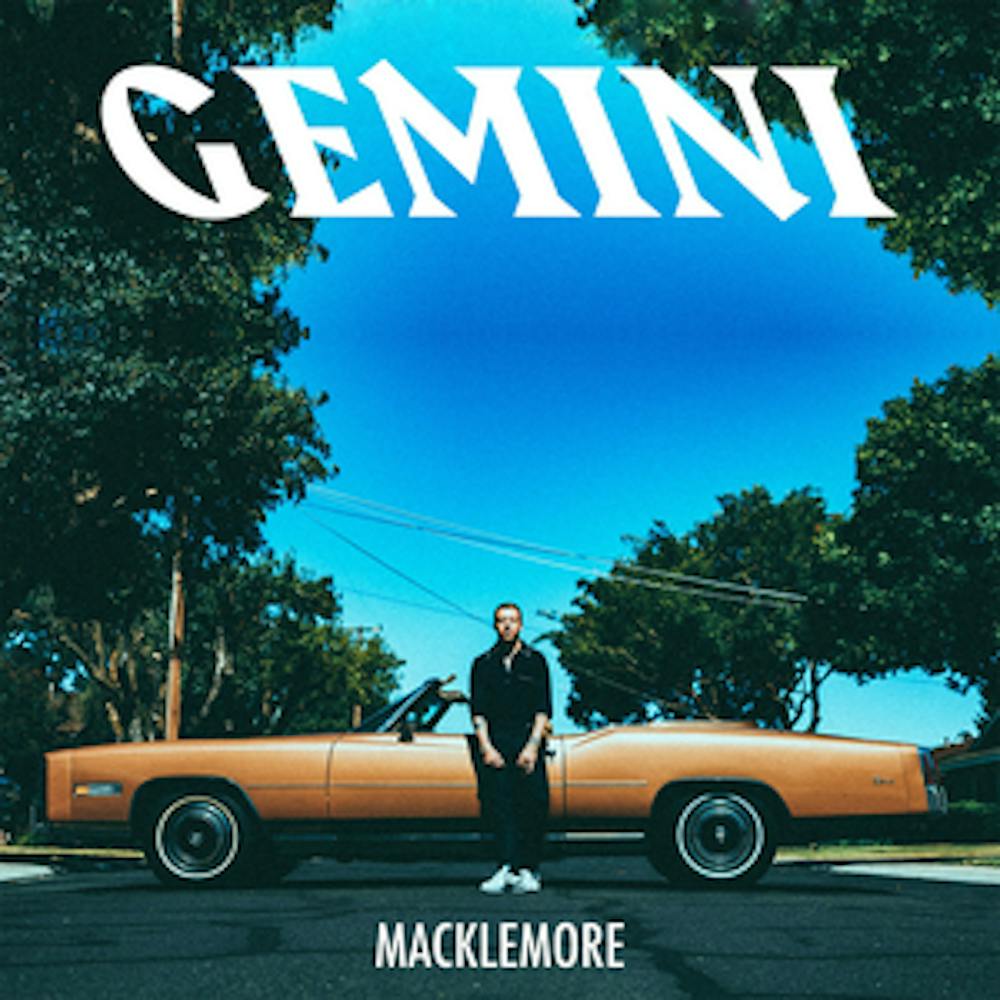Ben Haggerty — more commonly known by his stage name Macklemore — rose to fame overnight with the 2012 release of “Thrift Shop,” a silly earworm chronicling the benefits of buying an entire wardrobe from a secondhand store. The song joined the likes of “Gangnam Style” by South Korean artist PSY and “The Fox (What Does the Fox Say?)” by Norwegian duo Ylvis, creating a pop culture phenomenon of ridiculous yet catchy songs spanning 2012 and 2013. The difference between Haggerty and these other artists, however, was that he didn’t become a maintained his global influence. Instead, he politicized his lyrics and his image, becoming a relevant voice in American politics and pop culture.
His political lyricism is particularly present on the 2012 album “The Heist” by him and producer Ryan Lewis, which features the marriage-equality themed “Same Love” and the song “Wing$” which preaches the dangers of an overly-capitalistic society. His most intensely political piece was on the 2016 album “This Unruly Mess I’ve Made” with the song “White Privilege II,” which is a nearly nine-minute-long release weaving together chants of “Hands up, don’t shoot!” with racist messages, bringing forth the overall desire to end white complacency in institutional racism.
Haggerty built his artistic identity around progressive activism, but now, he is diverging from that image — and from longtime producer and musical partner Lewis.
The split was mutual, as Haggerty said in a recent interview with Sway Calloway on the radio show “Sway in the Morning.”
“It was a decision that we both came to,” he said. “I think with the last album and how intense it was at times — particularly making ‘White Privilege II,’ that was an intense, as it should have been, song to write.”
The heavy subject matter of “This Unruly Mess I’ve Made” exhausted the duo, and it was Lewis who suggested taking a break from working together for the next musical endeavor Haggerty planned to embark on.
And thus, “Gemini” was born — a 16-song album that is Macklemore’s first since splitting with Lewis. 15 of the 16 songs are in collaboration with other artists, with Haggerty bringing in Lil Yachty, Kesha, Reignwolf and more to help produce his latest effort.
“Gemini” is a significant detour from politics and progressivism, and is more of a glimpse into Haggerty — his life and his mindset post finding fame. For example, “Ain’t Gonna Die Tonight” featuring Eric Nally plays directly into Haggerty’s ego — “Open up the doors on ‘em, we playing tonight / Bring on the marching band and turn on the stadium lights / They gonna learn from me, this is our church to be / Life of a champion, ugh, so Freddie Mercury.”
Other songs are more reminiscent of the “Thrift Shop” and “Same Love” era, such as the flashy “Marmalade” featuring Lil Yachty. The confident track bears no message aside from the desire to show off a car while riding through town — “King of the road I drive slow like whoa / And I just switched over to Geico like whoa / Celebrating these life goals / But you ain’t getting no ride home.”
Meanwhile, the song “Intentions” featuring Dan Caplen, pokes fun at the political voice listeners are so used to hearing from Macklemore. “I want world peace / But I want to watch WorldStar” is one of several lines in which Haggerty raps about the hypocrisy in his life — how his actions have differed from his public messages.
For the most part, however, the remaining tracks are more introspective, like “Firebreather” featuring Reignwolf, which discusses Haggerty’s passion for his music. Haggerty’s collaboration with Kesha, “Good Old Days,” describes his grappling with growing up.
Finally, there is the closing track “Excavate” featuring Saint Claire, which is about Haggerty and his family life. With lyrics like, “My greatest achievement isn’t the dollars / My greatest achievement isn’t the followers / My greatest achievement is the accolades / My greatest achievement is my daughter,” “Excavate” arguably stands as the most personal song on the album.
For his first solo release after parting ways with Lewis, it seems fitting for Haggerty to turn his wandering mind inward as opposed to outward, making revelations not about American culture and society but about himself. Haggerty even chose to title the album with a personal touch, as Gemini is the June-born rapper’s zodiac sign. This album exposes Haggerty as the man behind the curtain, behind the Macklemore image.
An artist known for his progressivism, Haggerty’s releasing of a non-political album is an interesting choice given the current context of the American political scene. This decision highlights Haggerty’s genuine desire to share a truer version of himself with his fans and with listeners everywhere. “Gemini” as a whole is a fun and danceable listen that still manages to share a more human side of the previously larger-than-life, fur coat-clad Macklemore. By not trying so hard to relate to the public through political rhetoric, Haggerty has made himself — and his music — even more relatable.





